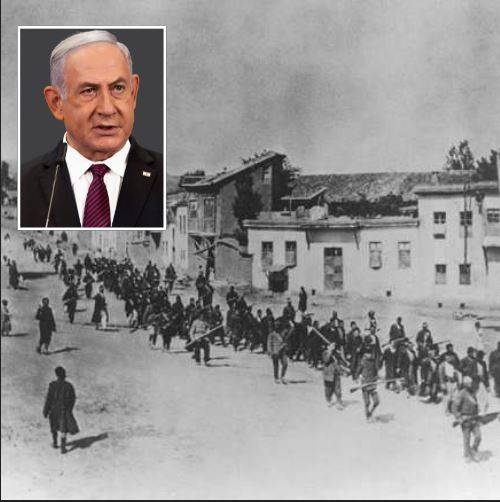1666 Views
Netanyahu Plays the Armenian Genocide Card: A New Flashpoint with Turkey
In recent days, a speech by the Israeli Prime Minister regarding the Armenian genocide by Turkey has stirred a wave of reactions across the region. Ankara officially condemned the remarks, describing them as an insult to the Ottoman legacy. Israel’s recognition of this event could have direct repercussions on its relations with both Turkey and Azerbaijan. Below, we examine the reasons behind Netanyahu’s position at this specific moment:
Rising Diplomatic Tensions with Ankara
Turkey has consistently denied claims of genocide against Armenians and has reacted strongly whenever other countries recognized it. The Israeli Prime Minister’s statement, even if personal, is considered provocative by Ankara and risks pushing the already fragile relations between Israel and Turkey into a new phase of tension. Given that Israel has been under intense diplomatic pressure following its genocide in Gaza, this new dispute could further complicate its regional standing.
Israel’s Use of the “War of Narratives”
Israel’s stance could also cause moral and political headaches for Turkey, amplifying pressure in the media to downplay Ankara’s criticism of Israel’s crimes in Gaza. In effect, Israel is attempting to reframe the narrative: while controlling much of global media, it seeks to weaken Turkey’s credibility in opposing Tel Aviv’s actions.
A Symbolic Gesture to Armenians and a Message to Baku
Netanyahu’s remarks, even if unofficial, represent a symbolic gain for Armenia and the Armenian diaspora. This development could strengthen ties between Yerevan and Tel Aviv, something that would heighten the sensitivities of both Turkey and Azerbaijan. It appears that Israel is sending a signal to Ankara and Baku — pressing them for greater concessions and ensuring their support in potential future conflicts with Iran. For Armenia, such recognition bolsters its leverage against Azerbaijan, potentially shifting the balance of power after the joint backing it has already received from Washington and Tel Aviv.
Likely Limited Reaction from Ankara
Since Netanyahu’s remarks have not yet been formalized into an official government or parliamentary position, Turkey’s response is expected to remain limited to verbal condemnation and political protests. Past precedent shows that Ankara avoids serious confrontation with Israel, choosing instead to engage in rhetorical and media disputes. Considering Turkey’s broad economic ties with Israel, any escalation is unlikely. Moreover, powerful Western lobbies within Turkey act as a barrier against major policy shifts in Ankara’s foreign relations.
Conclusion
The current tension between Turkey and Israel is primarily a battle of narratives. Israel aims to pressure Ankara into softening its anti-Israeli positions while extracting maximum geopolitical concessions from both Turkey and Azerbaijan. This strategy is part of Israel’s broader attempt to fracture West Asia’s regional order, weaken Iran’s neighbors, and ensure their passivity in the event of Israeli strikes against Iran.
Turkey, therefore, must remain vigilant against Tel Aviv’s long-term ambitions, particularly its expansionist “Nile-to-Euphrates” doctrine, which poses risks not only to Iran but also to Turkey’s own national interests.
*Translated by Ashraf Hemmati from the original Persian article written by Amirali Yeganeh
1. https://www.euronews.com/2025/08/27/israels-prime-minister-benjamin-netanyahu-recognises-armenian-genocide-for-first-time
2. https://www.theguardian.com/world/2015/apr/15/turkey-cannot-accept-armenia-genocide-label-erdogan
3. https://www.timesofisrael.com/liveblog_entry/turkey-slams-netanyahu-for-politically-motivated-recognition-of-armenian-genocide/

Comment
Post a comment for this article